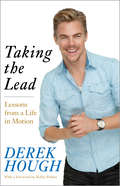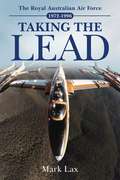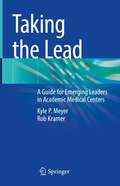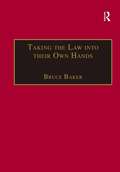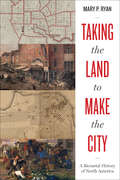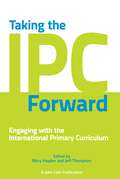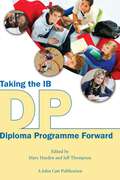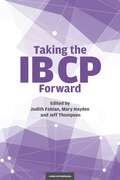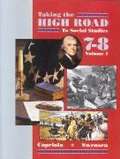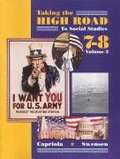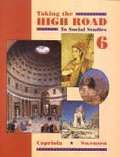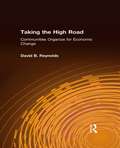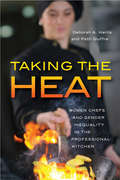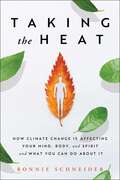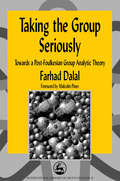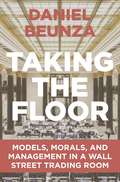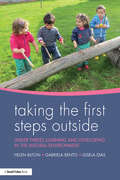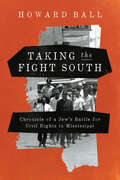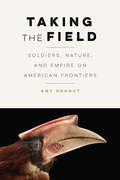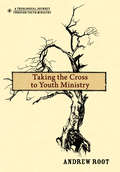- Table View
- List View
Taking the Lead
by Derek HoughSometimes I've taken home the trophy, sometimes I've stumbled or tripped over my own feet. But every move I've made has shaped me into the person I am today.Season after season, millions of fans tune into Dancing with the Stars to watch Derek Hough, the talented, consummate competitor whose skill and commitment have made him the show's all-time champion. Whether he's dancing with an Olympic gold medalist, an internationally renowned recording star, or a celebrated actress, Derek has an undeniable talent for bringing out the best in his partners. He does more than just tutor them in the fox-trot and paso doble--he teaches them how to see beyond their limits and realize their true potential.Now, for the first time ever, Derek opens up about his transformation from bullied little boy to accomplished performer and coach who lets nothing--and no one--stand in his way. In Taking the Lead he details how his experiences have taught him to embrace a positive outlook, channel his creativity and drive, and face his fears head-on.From his early training in London beginning at the age of twelve, to grueling dance competitions around the world, to never-before-told stories from behind the scenes of Dancing with the Stars, Derek writes with honesty and insight about his extraordinary journey. And in sharing his own story, he shows all of us how we can take charge of pursuing our goals, overcome obstacles, and become winners--not just on the dance floor but in life.
Taking the Lead: The Royal Australian Air Force 1972-1996
by Mark LaxAs Australia withdrew from Vietnam in 1972, few in the Australian Defence Force, none the least those in the Royal Australian Air Force could foresee the immense change that would sweep across the Service. New and emerging international relationships, changing Australian social attitudes, and a growing sense of defence self-reliance would all impact how the RAAF contributed to the application of air power in the defence of the nation and in supporting Australia&’s wider national interests.For the first time, Taking the Lead brings to the reader a comprehensive and authoritative study of how the RAAF matured over its third quarter century, how it met the challenges faced, and how it finally came of age, able to take the lead when asked. By 1996, plans were in place such that the RAAF was well on the way to becoming the world&’s first fifth generation air force, by making a remarkable transition.This volume also dispels the myth that the RAAF did little in the latter part of the twentieth century but train. In fact, the RAAF was at the forefront of operations as wide afield as the Sub-Continent, the Middle East, Africa and South-East Asia. Then there was aid to the civil community as well as aid to those nations seeking help in wider Asia-Pacific region. Clever force restructuring for expeditionary operations amid the stress of downsizing by almost a third, meant that future operations in the twenty-first century were to be a success.Taking the Lead is not just about aircraft, bases and flying. It considers the strategic environment of the era, the factors that affected personnel and training, how the RAAF&’s force structure advanced and how the RAAF managed its successes and failures. For those seeking to learn more about their air force, then this book is essential reading. Taking the Lead covers this vital part of the RAAF&’s unfolding narrative, and perfectly illustrates how the RAAF remained true to its motto – Per Ardua ad Astra – Through Adversity to the Stars.
Taking the Lead: A Guide for Emerging Leaders in Academic Medical Centers
by Kyle P. Meyer Rob KramerThis practical, insightful title is a must read for anyone interested in or recently appointed to a leadership role in an academic medical center. Taking the Lead: A Guide for Emerging Leaders in Academic Medical Centers represents the highly accomplished authors’ more than 60 years of collective insights about leadership and leading effectively in an academic medical center environment. The authors present creative and highly applicable themes synthesized from their knowledge, career experiences, unique reflections, practice, mistakes, and observations of successful (and not so successful) leaders. The result is a book of leadership wisdom – a wealth of ideas, concepts, and insights to inform the reader’s career journey and to become the best leader they can be. Organized in five parts, this work examines the successful leadership transition in the unique (and sometimes perplexing) academic medical center environment. Informal, conversational in tone, and often engagingly humorous, Taking the Lead: A Guide for Emerging Leaders in Academic Medical Centers represents a concise and invaluable introductory read for the next generation of leaders, as well as a helpful resource for experienced healthcare leaders.
Taking the Law into their Own Hands: Lawless Law Enforcers in Africa (The Making of Modern Africa)
by Bruce BakerOver much of Africa, crime and insurgency are a serious problem and one in which the distinction between the two is being eroded. Left without state protection people have sought to preserve their lives and property through vigilante groups and militias that pay scant attention to the law or human rights. Likewise, the state security forces, under pressure to cut crime and rebel activity, readily discard lawful procedures. Torture provides them with vital information, whilst extra-judicial executions save the need to go through the prolonged criminal justice system. After a general overview of the role of the rule of law in a democratic society, Bruce Baker provides five case studies that capture the current complex realities and their impact on the new democracies. The citizen responses considered are vigilantes in East African pastoral economies, The Bakassi Boys an anti-crime group in Nigeria and private policing initiatives in South Africa. The state responses are those of the Ugandan Defence Forces towards the Lords Resistance Army, the Senegalese army towards the Casamance secessionists and the Mozambique Police response towards criminals.
Taking the Land to Make the City: A Bicoastal History of North America (Lateral Exchanges: Architecture, Urban Development, and Transnational Practices)
by Mary P. RyanThe history of the United States is often told as a movement westward, beginning at the Atlantic coast and following farmers across the continent. But cities played an equally important role in the country’s formation. Towns sprung up along the Pacific as well as the Atlantic, as Spaniards and Englishmen took Indian land and converted it into private property. In this reworking of early American history, Mary P. Ryan shows how cities—specifically San Francisco and Baltimore—were essential parties to the creation of the republics of the United States and Mexico. Baltimore and San Francisco share common roots as early trading centers whose coastal locations immersed them in an international circulation of goods and ideas. Ryan traces their beginnings back to the first human habitation of each area, showing how the juggernaut toward capitalism and nation-building could not commence until Europeans had taken the land for city building. She then recounts how Mexican ayuntamientos and Anglo American city councils pioneered a prescient form of municipal sovereignty that served as both a crucible for democracy and a handmaid of capitalism. Moving into the nineteenth century, Ryan shows how the citizens of Baltimore and San Francisco molded landscape forms associated with the modern city: the gridded downtown, rudimentary streetcar suburbs, and outlying great parks. This history culminates in the era of the Civil War when the economic engines of cities helped forge the East and the West into one nation.
Taking the Land to Make the City: A Bicoastal History of North America (Lateral Exchanges: Architecture, Urban Development, and Transnational Practices)
by Mary P. RyanThis historical study shows how San Francisco and Baltimore were central to American expansion through the eighteenth and nineteenth centuries. The history of the United States is often told as a movement westward, beginning at the Atlantic coast and following farmers across the continent. But early settlements and towns sprung up along the Pacific as well as the Atlantic, as Spaniards and Englishmen took Indian land and converted it into private property. In this ambitious study of historical geography and urban development, Mary P. Ryan reframes the story of American expansion. Baltimore and San Francisco share common roots as early coastal trading centers immersed in the international circulation of goods and ideas. Ryan traces their beginnings back to the first human habitation of each area, showing how the juggernaut toward capitalism and nation-building could not commence until Europeans had taken the land for city building. She then recounts how Mexican ayuntamientos and Anglo-American city councils pioneered a prescient form of municipal sovereignty that served as both a crucible for democracy and a handmaid of capitalism. Moving into the nineteenth century, Ryan shows how the citizens of Baltimore and San Francisco molded the shape of the modern city: the gridded downtown, rudimentary streetcar suburbs, and outlying great parks. This history culminates in the era of the Civil War when the economic engines of cities helped forge the East and the West into one nation.
Taking the IPC Forward: Engaging with the International Primary Curriculum
by Jeff Thompson Mary HaydenSince its introduction in 2000, well over 1000 schools in more than 65 different countries have adopted the IPC. In this book, educators raise and discuss implications for the future implementation of this innovative curriculum within the context of a changing world.
Taking the IPC Forward: Engaging with the International Primary Curriculum
by Jeff Thompson Mary HaydenSince its introduction in 2000, well over 1000 schools in more than 65 different countries have adopted the IPC. In this book, educators raise and discuss implications for the future implementation of this innovative curriculum within the context of a changing world.
Taking the IB Diploma Programme Forward (Taking it Forward)
by Jeff Thompson Mary HaydenExpert writers share their thoughts and opinions on the future of the International Baccalaureate Diploma Programme. The editors and contributors, all experts in their field, identify issues arising from current practice and indicate how those issues need to be addressed as part of a policy for future growth.
Taking the IB Diploma Programme Forward (Taking it Forward)
by Jeff Thompson Mary HaydenExpert writers share their thoughts and opinions on the future of the International Baccalaureate Diploma Programme. The editors and contributors, all experts in their field, identify issues arising from current practice and indicate how those issues need to be addressed as part of a policy for future growth.
Taking the IB CP Forward (Taking it Forward)
by Jeff Thompson Judith Fabian Mary HaydenThe IB Career-related Programme for 16 to 19 year olds was launched in 2012. Designed for young people who want to prepare for a career and the world of work alongside their academic studies, this innovative programme adds a new dimension to an IB education, opening it up to a wider range of student needs and aspirations. This edited collection provides ideas and support for those involved in implementing the CP, or planning to introduce it in the future. The chapters are written by practitioners, some of whom have been involved with the CP from its earliest days, who provide forthright accounts of the significant rewards the introduction of the CP has brought to their students. Taking the IB CP Forward explores the key elements of the programme, its flexibility and how it can implemented to meet the needs of a range of educational contexts. Contributors: Dominic Robeau, Theresa Forbes, Chantell Wyten, Cathryn Berger Kaye, Patrick Daneau, Alexandra Juniper, Sara Woodcock, Ramona Dietrich, Mike Worth, Catheryn Phipps-Orive, Paul Campbell, Natasha Deflorian, David Barrs, Tony Smith, Kate Greig, John Carozza, Conan de Wilde, Peter Kotrc, Julia Peters, Stewart Redden, John Bastable.
Taking the IB CP Forward (Taking it Forward)
by Jeff Thompson Judith Fabian Mary HaydenThe IB Career-related Programme for 16 to 19 year olds was launched in 2012. Designed for young people who want to prepare for a career and the world of work alongside their academic studies, this innovative programme adds a new dimension to an IB education, opening it up to a wider range of student needs and aspirations. This edited collection provides ideas and support for those involved in implementing the CP, or planning to introduce it in the future. The chapters are written by practitioners, some of whom have been involved with the CP from its earliest days, who provide forthright accounts of the significant rewards the introduction of the CP has brought to their students. Taking the IB CP Forward explores the key elements of the programme, its flexibility and how it can implemented to meet the needs of a range of educational contexts. Contributors: Dominic Robeau, Theresa Forbes, Chantell Wyten, Cathryn Berger Kaye, Patrick Daneau, Alexandra Juniper, Sara Woodcock, Ramona Dietrich, Mike Worth, Catheryn Phipps-Orive, Paul Campbell, Natasha Deflorian, David Barrs, Tony Smith, Kate Greig, John Carozza, Conan de Wilde, Peter Kotrc, Julia Peters, Stewart Redden, John Bastable.
Taking the High Road to Social Studies - Book 7-8 (Vol #1)
by Arlene Capriola Rigmor SwensenTaking the High Road to Social Studies, Book 7/8 Volume 1 This program integrates reading and writing with social studies themes and concepts. Students use SQ3R to get the most of out reading and respond to constructed response and DBQ (document-based) questions.
Taking the High Road to Social Studies 7-8 Volume 2: Reconstruction To The Present
by Arlene Capriola Rigmor SwensenWe deeply appreciate the help so willingly given by many people. In particular, we wish to express our debt and gratitude to Josephine Imwalle, Social Studies Coordinator to the Northport East North School District in New York, for her guidance and expertise;
Taking the High Road to Social Studies: 6
by Arlene Capriola Rigmor SwensenThis program integrates reading and writing with social studies themes and concepts. Students use SQ3R to get the most of out reading and respond to constructed response and DBQ (document-based) questions.
Taking the High Road: Communities Organize for Economic Change
by David B ReynoldsThis book presents a vision for farreaching economic change in America connected to practical grassroots steps. It points to an economic system in which corporate success merges with the long-term welfare of the workers and the general population. The author examines the continued reality of social democracy in Europe and what lessons can be learned for the U.S. He demonstrates how progressive economic change is already being fought for by labor and community groups throughout America in such efforts as the Living Wage Movement and the emerging battle against sprawl. And he provides a wealth of concrete examples, tools, and ideas that everyone can use to organize for economic and social justice in their own communities.
Taking the Heat
by Deborah A. Harris Patti GiuffreA number of recent books, magazines, and television programs have emerged that promise to take viewers inside the exciting world of professional chefs. While media suggest that the occupation is undergoing a transformation, one thing remains clear: being a chef is a decidedly male-dominated job. Over the past six years, the prestigious James Beard Foundation has presented 84 awards for excellence as a chef, but only 19 were given to women. Likewise, Food and Wine magazine has recognized the talent of 110 chefs on its annual "Best New Chef" list since 2000, and to date, only 16 women have been included. How is it that women--the gender most associated with cooking--have lagged behind men in this occupation? Taking the Heat examines how the world of professional chefs is gendered, what conditions have led to this gender segregation, and how women chefs feel about their work in relation to men. Tracing the historical evolution of the profession and analyzing over two thousand examples of chef profiles and restaurant reviews, as well as in-depth interviews with thirty-three women chefs, Deborah A. Harris and Patti Giuffre reveal a great irony between the present realities of the culinary profession and the traditional, cultural associations of cooking and gender. Since occupations filled with women are often culturally and economically devalued, male members exclude women to enhance the job's legitimacy. For women chefs, these professional obstacles and other challenges, such as how to balance work and family, ultimately push some of the women out of the career. Although female chefs may be outsiders in many professional kitchens, the participants in Taking the Heat recount advantages that women chefs offer their workplaces and strengths that Harris and Giuffre argue can help offer women chefs--and women in other male-dominated occupations--opportunities for greater representation within their fields. Click here to access the Taking the Heat teaching guide (http://rutgerspress.rutgers.edu/pages/teaching_guide_for_taking_the_heat.aspx).
Taking the Heat: How Climate Change Is Affecting Your Mind, Body, and Spirit and What You Can Do About It
by Bonnie SchneiderFrom meteorologist and Peabody Award–winning journalist Bonnie Schneider, an innovative look at how climate change is already threatening our mental and physical health and practical tips for you to tackle these challenges head on.The impacts of climate change have become dire. Rising temperatures, volatile weather, and poor air quality affect our physical and mental health in dangerous new ways. From increasing the risk of infectious disease to amplifying emotional stress and anxiety—even the healthiest among us are at risk. Bonnie Schneider has tracked environmentally-linked physiological impacts throughout her career as a TV journalist, meteorologist, and the founder of Weather & Wellness©—a platform that explores the connection between weather, climate change, and health. In Taking the Heat, Schneider provides crucial advice from science experts and medical professionals to help you: -Cope with the mental anguish of &“eco-anxiety&” and other climate change fears for our planet&’s future, particularly expressed by millennials and Gen-Z -Identify health hazards caused by extreme heat and air pollution that disproportionally affect low-income and minority communities -Uncover the science behind longer and stronger allergy seasons and learn new ways to reduce your risk of adverse allergic reactions -Detect the increased threat of dangerous pathogens lurking in unexpected places and why we may face future pandemics -Understand how seasonal fluctuations of sunlight, heat, and humidity can not only factor into feelings of depression and anxiety but also can trigger flare-ups for certain auto-immune diseases -Discover how meditation and mindfulness practices can ease the psychological stress that often occurs in the aftermath of devastating natural disasters -Explore how the Earth&’s rising temperatures may rob you of restorative sleep and impair mental sharpness -Learn why increased levels of CO2 in the atmosphere may reduce the availability of what you choose to eat; learn sustainable solutions—from food to fitness - And more! Anchored in the latest scientific research and filled with relatable first-person stories, this book is the one guide you need to navigate the future of your own health—mind, body, and spirit, in a rapidly changing environment.
Taking the Group Seriously: Towards a Post-Foulkesian Group Analytic Theory
by Farhad DalalIn this critique and extension of the work of S.H.Foulkes, Farhad Dalal presents a thorough contemporary appraisal of the theory of group analysis and its relevance to psychoanalysis as a whole. The author argues that Foulkes failed to develop a specific set of group concepts, relying instead on the traditional individualistic framework of Freud. The book explores why Foulkes failed to escape from the orthodox mother-infant paradigm and offers a new post-Foulkesian interpretation of group analytic theory. Taking the Group Seriously is divided into six parts which trace the history of ideas behind group work, and draws on a wide range of subjects to support its thesis: not only psychoanalysis and group analysis, but also sociology, biology, chaos theory, genetics, economics, game theory and discourse theory. Using the author's practical group experience and including the latest ideas on the subject, this volume will be of interest to all those working in the field of psychoanalysis.
Taking the Floor: Models, Morals, and Management in a Wall Street Trading Room
by Daniel BeunzaDebates about financial reform have led to the recognition that a healthy financial system doesn’t depend solely on how it is structured—organizational culture matters as well. Based on extensive research in a Wall Street derivatives-trading room, Taking the Floor considers how the culture of financial organizations might change in order for them to remain healthy, even in times of crises. In particular, Daniel Beunza explores how the extensive use of financial models and trading technologies over the recent decades has exerted a far-ranging and troubling influence on Wall Street. How have models reshaped financial markets? How have models altered moral behavior in organizations?Beunza takes readers behind the scenes in a bank unit that, within its firm, is widely perceived to be “a class act,” and he considers how this trading room unit might serve as a blueprint solution for the ills of Wall Street’s unsustainable culture. Beunza demonstrates that the integration of traders across desks reduces the danger of blind spots created by models. Warning against the risk of moral disengagement posed by the use of models, he also contends that such disengagement could be avoided by instituting moral norms and social relations.Providing a unique perspective on a complex subject, Taking the Floor profiles what an effective, responsible trading room can and should look like.
Taking the First Steps Outside: Under threes learning and developing in the natural environment
by Helen Bilton Gabriela Bento Gisela DiasCan one be too young to play outside? This unique and compelling book charts the experiences of a group of under-three-year-olds as they explore their natural outdoor environment, followed by caring and attentive adults. It deconstructs the myths that underestimate under threes and celebrates the importance of connecting children with the natural world and the influence of positive relationships in this early stage of life. Taking the First Steps Outside draws on all aspects of working outdoors, focusing on different steps of the project, main achievements and obstacles, implemented strategies and benefits for the development of young children. Features include: Stunning photographs of children exploring the outdoor environment, who are interested, thoughtful, persistent and successful Detailed descriptions of real events, illustrating how the outdoor space can be an educational context for under threes Insight into the role of the adult, as they observe and reflect upon children’s learning Advice on choosing the right resources and facilities to create a good outdoor learning environment for the young child Advice about risky play and promoting challenging and positive opportunities in the natural environment Guidance on how to set up an outdoor project for children under three Written to support all students, teachers, practitioners and managers working with under threes, this essential guide will help you to develop your knowledge, build confidence and gain the ability to co-explore outdoors with children.
Taking the Fight South: Chronicle of a Jew's Battle for Civil Rights in Mississippi
by Howard BallTaking the Fight South provides a timely and telling reminder of the vigilance democracy requires if racial justice is to be fully realized.Distinguished historian and civil rights activist Howard Ball has written dozens of books during his career, including the landmark biography of Thurgood Marshall, A Defiant Life, and the critically acclaimed Murder in Mississippi, chronicling the Mississippi Burning killings. In Taking the Fight South, arguably his most personal book, Ball focuses on six years, from 1976 to 1982, when, against the advice of friends and colleagues in New York, he and his Jewish family moved from the Bronx to Starkville, Mississippi, where he received a tenured position in the political science department at Mississippi State University. For Ball, his wife, Carol, and their three young daughters, the move represented a leap of faith, ultimately illustrating their deep commitment toward racial justice.Ball, with breathtaking historical authority, narrates the experience of his family as Jewish outsiders in Mississippi, an unfamiliar and dangerous landscape contending with the aftermath of the civil rights struggle. Signs and natives greeted them with a humiliating and frightening message: “No Jews, Negroes, etc., or dogs welcome.” From refereeing football games, coaching soccer, and helping young black girls integrate the segregated Girl Scout troops in Starkville, to life-threatening calls from the KKK in the middle of the night, from his work for the ACLU to his arguments in the press and before a congressional committee for the extension of the 1965 Voting Rights Act, Ball takes the reader to a precarious time and place in the history of the South. He was briefly an observer but quickly became an activist, confronting white racists stubbornly holding on to a Jim Crow white supremacist past and fighting to create a more diverse, equitable, and just society.Ball’s story is one of an imitable advocate who didn’t just observe as a passive spectator but interrupted injustice. Taking the Fight South will join the list of required books to read about the Black Lives Matter movement and the history of racism in the United States. The book will also appeal to readers interested in Judaism because of its depiction of anti-Semitism directed toward Starkville’s Jewish community, struggling to survive in the heart of the deep and very fundamentalist Protestant South.
Taking the Field: Soldiers, Nature, and Empire on American Frontiers (Many Wests)
by Amy KohoutPublished in Cooperation with the William P. Clements Center for Southwest Studies, Southern Methodist University. In the late nineteenth century, at a time when Americans were becoming more removed from nature than ever before, U.S. soldiers were uniquely positioned to understand and construct nature&’s ongoing significance for their work and for the nation as a whole. American ideas and debates about nature evolved alongside discussions about the meaning of frontiers, about what kind of empire the United States should have, and about what it meant to be modern or to make &“progress.&” Soldiers stationed in the field were at the center of these debates, and military action in the expanding empire brought new environments into play. In Taking the Field Amy Kohout draws on the experiences of U.S. soldiers in both the Indian Wars and the Philippine-American War to explore the interconnected ideas about nature and empire circulating at the time. By tracking the variety of ways American soldiers interacted with the natural world, Kohout argues that soldiers, through their words and their work, shaped Progressive Era ideas about both American and Philippine environments. Studying soldiers on multiple frontiers allows Kohout to inject a transnational perspective into the environmental history of the Progressive Era, and an environmental perspective into the period&’s transnational history. Kohout shows us how soldiers—through their writing, their labor, and all that they collected—played a critical role in shaping American ideas about both nature and empire, ideas that persist to the present.
Taking the EU to Court: Annulment Proceedings and Multilevel Judicial Conflict (Palgrave Studies in European Union Politics)
by Christian Adam Emmanuelle Mathieu Michael W. Bauer Miriam HartlappThis open access book provides an exhaustive picture of the role that annulment conflicts play in the EU multilevel system. Based on a rich dataset of annulment actions since the 1960s and a number of in-depth case studies, it explores the political dimension of annulment litigation, which has become an increasingly relevant judicial tool in the struggle over policy content and decision-making competences. The book covers the motivations of actors to turn policy conflicts into annulment actions, the emergence of multilevel actors’ litigant configurations, the impact of actors’ constellations on success in court, as well as the impact of annulment actions on the multilevel policy conflicts they originate from.
Taking the Cross to Youth Ministry
by Andrew RootThink about sin and the cross—the way that salvation changes who we are and how God sees us. It’s a central part of our faith, and yet it’s one of the most confusing and difficult things to teach. Especially to a room full of teenagers. In Taking the Cross to Youth Ministry, Andrew Root invites you along on a journey with Nadia—a fictional youth worker who is wrestling with how to present the cross to her own students in a meaningful way. Using Nadia’s narrative, along with his own insights, Root helps you reimagine how the cross, sin, and salvation can be taught to students in a way that leads them to embrace a lifestyle that chases after Jesus, rather than creating teenagers who just try to “be good.”
